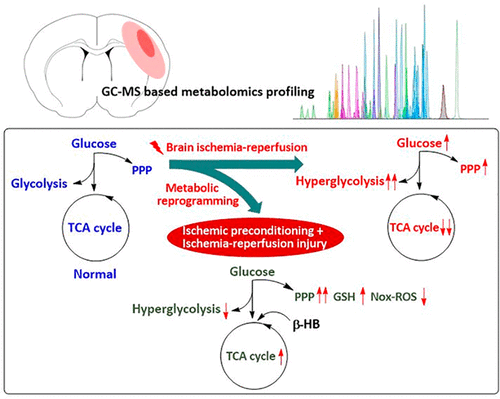当前位置:
X-MOL 学术
›
J. Proteome Res.
›
论文详情
Our official English website, www.x-mol.net, welcomes your feedback! (Note: you will need to create a separate account there.)
Metabolomic Profiling Reveals That Reprogramming of Cerebral Glucose Metabolism Is Involved in Ischemic Preconditioning-Induced Neuroprotection in a Rodent Model of Ischemic Stroke.
Journal of Proteome Research ( IF 4.4 ) Pub Date : 2018-10-26 , DOI: 10.1021/acs.jproteome.8b00339 Jianliang Geng 1, 2 , Yue Zhang 1 , Sijia Li 1 , Shuning Li 1 , Jiankun Wang 1 , Hong Wang 1 , Jiye Aa 1 , Guangji Wang 1
Journal of Proteome Research ( IF 4.4 ) Pub Date : 2018-10-26 , DOI: 10.1021/acs.jproteome.8b00339 Jianliang Geng 1, 2 , Yue Zhang 1 , Sijia Li 1 , Shuning Li 1 , Jiankun Wang 1 , Hong Wang 1 , Jiye Aa 1 , Guangji Wang 1
Affiliation

|
Ischemic tolerance renders the brain resistant to ischemia-reperfusion (I/R) injury as a result of the activation of endogenous adaptive responses triggered by various types of preconditioning. The complex underlying metabolic mechanisms responsible for the neuroprotection of cerebral ischemic preconditioning (IPC) remain elusive. Herein, gas chromatography-mass spectrometry (GC-MS) technique was applied to delineate the dynamic changes of brain metabolome in a rodent model of ischemic stroke (transient occlusion of the middle cerebral artery, tMCAO), alone or after pretreatment with nonlethal ischemic tolerance induction (transient occlusion of the bilateral common carotid arteries, tBCCAO). Metabolomic analysis showed that accumulation of glucose (concentration increased more than 4 fold) and glycolytic intermediates is the prominent feature of brain I/R-induced metabolic disturbance. IPC attenuated brain I/R damage by subduing postischemic hyperglycolysis, increasing the pentose phosphate pathway (PPP) flux and promoting the utilization of β-hydroxybutyrate. The expression analysis of pivotal genes and proteins involved in relevant metabolic pathways revealed that the downregulation of AMP-activated protein kinase (AMPK)-mediated glucose transporter-1 (GLUT-1) and 6-phosphofructo-2-kinase/fructose-2,6-bisphosphatase-3 (PFKFB3) and reduced mRNA levels of nicotinamide adenine dinucleotide phosphate (NADPH) oxidase (NOX) subunits were associated with IPC-induced metabolic flexibility, which allows the brain to be more capable of withstanding severe I/R insults. The present study provided mechanistic insights into the metabolic signature of IPC and indicated that adaptively modulating brain glucose metabolism could be an effective approach for the therapeutic intervention of ischemic stroke.
中文翻译:

代谢组学分析表明,在缺血性中风的啮齿动物模型中,脑葡萄糖代谢的重编程涉及缺血预处理引起的神经保护作用。
由于各种预处理引起的内源性适应性反应的激活,缺血耐受性使大脑对缺血再灌注(I / R)损伤具有抵抗力。负责脑缺血预处理(IPC)的神经保护的复杂的潜在代谢机制仍然难以捉摸。本文中,采用气相色谱-质谱(GC-MS)技术描述了缺血性卒中(大脑中动脉的短暂性闭塞,tMCAO)的啮齿动物模型中脑代谢组的动态变化,该模型单独使用或采用非致死性缺血耐受进行预处理诱导(双侧颈总动脉短暂闭塞,tBCCAO)。代谢组学分析表明,葡萄糖(浓度增加超过4倍)和糖酵解中间体的蓄积是脑I / R引起的代谢紊乱的突出特征。IPC通过减轻缺血后的高糖酵解作用来减轻脑I / R损伤,增加磷酸戊糖途径(PPP)通量并促进β-羟基丁酸酯的利用。参与相关代谢途径的关键基因和蛋白质的表达分析表明,AMP激活的蛋白激酶(AMPK)介导的葡萄糖转运蛋白1(GLUT-1)和6-磷酸果糖-2-激酶/果糖2的下调, 6-双磷酸酶3(PFKFB3)和烟酰胺腺嘌呤二核苷酸磷酸(NADPH)氧化酶(NOX)亚基mRNA水平的降低与IPC诱导的代谢灵活性相关,这使大脑更有能力抵御严重的I / R伤害。本研究提供了对IPC代谢特征的机械见解,并指出自适应调节脑葡萄糖代谢可能是缺血性中风的治疗性干预的有效方法。
更新日期:2018-10-26
中文翻译:

代谢组学分析表明,在缺血性中风的啮齿动物模型中,脑葡萄糖代谢的重编程涉及缺血预处理引起的神经保护作用。
由于各种预处理引起的内源性适应性反应的激活,缺血耐受性使大脑对缺血再灌注(I / R)损伤具有抵抗力。负责脑缺血预处理(IPC)的神经保护的复杂的潜在代谢机制仍然难以捉摸。本文中,采用气相色谱-质谱(GC-MS)技术描述了缺血性卒中(大脑中动脉的短暂性闭塞,tMCAO)的啮齿动物模型中脑代谢组的动态变化,该模型单独使用或采用非致死性缺血耐受进行预处理诱导(双侧颈总动脉短暂闭塞,tBCCAO)。代谢组学分析表明,葡萄糖(浓度增加超过4倍)和糖酵解中间体的蓄积是脑I / R引起的代谢紊乱的突出特征。IPC通过减轻缺血后的高糖酵解作用来减轻脑I / R损伤,增加磷酸戊糖途径(PPP)通量并促进β-羟基丁酸酯的利用。参与相关代谢途径的关键基因和蛋白质的表达分析表明,AMP激活的蛋白激酶(AMPK)介导的葡萄糖转运蛋白1(GLUT-1)和6-磷酸果糖-2-激酶/果糖2的下调, 6-双磷酸酶3(PFKFB3)和烟酰胺腺嘌呤二核苷酸磷酸(NADPH)氧化酶(NOX)亚基mRNA水平的降低与IPC诱导的代谢灵活性相关,这使大脑更有能力抵御严重的I / R伤害。本研究提供了对IPC代谢特征的机械见解,并指出自适应调节脑葡萄糖代谢可能是缺血性中风的治疗性干预的有效方法。


























 京公网安备 11010802027423号
京公网安备 11010802027423号